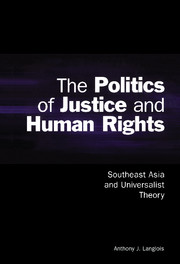Book contents
1 - The Asian Values Discourse
Published online by Cambridge University Press: 05 July 2014
Summary
Is there a distinctively ‘Asian’ concept of human rights? This question arises out of a debate that has been conducted in the international media, academic journals and political forums in response to claims made by political leaders within Asia that there are indeed distinctly Asian values. These values are said to have various sources – Confucianism and Asian interpretations of Islam prominent among them, along with more particularist cultural heritages such as those of Java and other sub-national groups. The values are said to be cultural values, and are understood to be at the heart of the ‘Asian worldview’. All aspects of life are thus informed by these values: family relationships, educational methods, social structures, political institutions and the process of politics itself are all nurtured, it is claimed, under the umbrella of Asian values.
This claim extends to concepts such as democracy and human rights and therefore has great significance because these are concepts which claim forms of universal normative applicability. It is then of importance to promoters of democracy and human rights to assess the challenge issued by the Asian values debate. The first part of this chapter reports in detail the claims made by the political elites of Malaysia, Indonesia and Singapore with respect to Asian values. To this end, the speeches and writings of various representatives of the political elites will be quoted, sometimes at length. The result is a pastiche of the views generally referred to as ‘Asian values’.
- Type
- Chapter
- Information
- The Politics of Justice and Human RightsSoutheast Asia and Universalist Theory, pp. 12 - 45Publisher: Cambridge University PressPrint publication year: 2001

